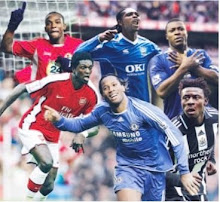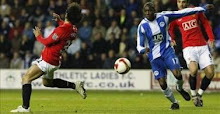So it wasn't close after all. Manchester United were in the Champions League final after just 11 minutes of last night's semi, from the moment Manuel Almunia was exposed by Cristiano Ronaldo's free kick.
That was the moment that put Arsenal flat on the canvas, their weak chin shattered, their senses scrambled. Needing four goals against the best-marshalled defence in the European game: they were already beaten, humiliated, mangled and there were still 80 minutes left to play.
It was at that point that the noise in the Emirates changed. Before kick off, this often contemplative stadium had been a cauldron of happy local expectation, of waving flags and cheery chants. Even after the first goal went in, there was still a grumble of defiance about the place. But after the Ronaldo rocket, the only sound came from the away fans, chirpily reprising Rafa Benitez's rant and announcing that they were "off to Rome and that's a fact". Mind, even that happy row was challenged as United went three up on the hour. It was then that the stadium began to echo to the clack-clack-clack of emptying seats.
There were many reasons for United's utter superiority on the night. There was the huge gulf in experience (only two of Arsenal's players had won a major trophy, whereas every one of United's needs an extension to their home to house the baubles). There was the lung-busting effort of the visiting players (evidenced in the distance Ronaldo - a player routinely and ignorantly derided by his many detractors as nothing but a showboater - ran to score the third). There was the magnificence of a defence that - unlike poor Kieran Gibbs, whose stumble had United followers smirkingly speculating that he was wearing John Terry's boots from last year's final - did not put a foot wrong. But the one that really matters, and oddly the one that is likely to be given the least prominence in the post mortem, is that in the tactical battle of the dug outs, their manager won hands down.
Alex Ferguson is reckoned to have many talents as a football manager. He is a superb judge of a player, he exudes a contagious passion and he is a wonderful motivator. As he recently revealed, among the many backroom staff at Carrington he does not employ a psychologist. Why should he? He does all that sort of thing himself. But what is not often recognised about him is his tactical nous. I recall once interviewing him following a game against Liverpool in which United had come from behind to win. I asked him why he thought it was, why had a seemingly determined Liverpool side had capitulated in the second half? He patiently explained that it might have had something to do with the fact that Steven Gerrard had been gifted the freedom of the park by the United midfield for the first 45 minutes, but a quick change of tactic at half time had seen his movement curtailed.
And so it was with Arsenal. In both legs, Ferguson out-foxed a manager who is often portrayed as his tactical superior. Everything the Scot did was a triumph. For a start, he picked exactly the right team to stifle the Gunners' habit of completing 45 consecutive passes before attempting a shot on goal. Knowing they have no Plan B, he dispatched Darren Fletcher, Anderson and Ji-Sung Park to tear at them. Cesc Fabgregas, Denilson and Samir Nasri barely had the space to breathe, never mind create. On the train back from the Emirates last night, I sat opposite some Arsenal fans who were bemoaning the fact that their team had been so comprehensively out played by "such ordinary players". Park, one of them moaned, had only been bought to sell shirts in the Far East and here he was dominating their team.
Well, not quite. Even after Gibbs's desperate slip had presented him with a chance, Park was required to demonstrate considerable skill to score. For those with ridiculously long memories, the United player he most brings to mind is Steve Coppell, a similarly all-action combination of endeavour and touch who still retains the longest sequence of first team appearances in United history. Ferguson sent Park out knowing the job that was required and he did it. Even for those of us who would argue that a United team is not a United team without Paul Scholes at its heart, it was the right choice. The Ginger General would simply not have been able to run like Park.
Not only did Ferguson select the right team, he played them in precisely the right way. Wayne Rooney was brilliant defensively, working as a shield on the left side, but still with enough forward nous to produce a wonderful pass for Ronaldo's second. In fact that goal was the glittering amalgam of all that Ferguson planned, the swiftness of its execution a thing as beautiful as it was brutal. The only downside to Ferguson's evening of personal triumph was Darren Fletcher's unhappy red card. One of the returning Arsenal fans suggested he would have been better off letting Fabregas through to score. But you suspect that if he had done that, Ferguson would immediately have crossed him off his final team. At Ferguson's United that is simply not the way.



 Amid the uncertainty surrounding the future of Manchester United striker Carlos Tevez, the question has to be asked: is he worth all the fuss?
Amid the uncertainty surrounding the future of Manchester United striker Carlos Tevez, the question has to be asked: is he worth all the fuss? 

















